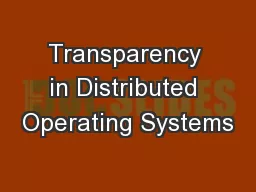PDF-Transparency, Accountability and Participation
Author : mitsue-stanley | Published Date : 2016-08-15
TAP Catalyzing inclusive and transformative Financing for Development Transparency Accountability and P articipation TAP must be at the heart of the Financing for
Presentation Embed Code
Download Presentation
Download Presentation The PPT/PDF document "Transparency, Accountability and Partici..." is the property of its rightful owner. Permission is granted to download and print the materials on this website for personal, non-commercial use only, and to display it on your personal computer provided you do not modify the materials and that you retain all copyright notices contained in the materials. By downloading content from our website, you accept the terms of this agreement.
Transparency, Accountability and Participation: Transcript
Download Rules Of Document
"Transparency, Accountability and Participation"The content belongs to its owner. You may download and print it for personal use, without modification, and keep all copyright notices. By downloading, you agree to these terms.
Related Documents














